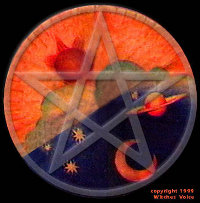Site features
The "Wren's Nest" news section of The Witches' Voice was used as a source for other Pagan publications. [5] The site includes posts by businesses and individuals, semi-monthly essays submitted by users, columns by regular contributors, and a monthly selection of Pagan musicians and bands. Witchvox also includes Witches of the World, which facilitates networking among site members and groups.
Since 2000, The Witches’ Voice included a section called “Bardic Circle” which is “a gathering… to share stories, magic and music”. [6] While this is traditionally done in a wooded area around a campfire, The Witches’ Voice invited NeoPagan musicians to share their music in downloadable mp3 files with Witches around the world. Some of the best musical artists and bands in NeoPagan circles participated over a ten-year period, including: Gaia Consort, Damh the Bard, SONA, Isaac Bonewits, Loke E Coyote. Beltana. sede, Magicfolk, Abigail Spinner McBride, Telling Point, The Reverend Rat, Cassandra Syndrome, Jhenah Telyndru, Lady Isadora, KIVA, Tribeworld Ensemble, Jay Atwood (who played didgeridoo for Wicked Tinkers and their album Banger for Breakfast), Tiffany Moon, Soren, Madd Mother Moose and Kari Tauring. [7]
The Witches' Voice was the largest international Neopagan site, with thousands of personal notices from users seeking to network with each other. [8]
This page is based on this
Wikipedia article Text is available under the
CC BY-SA 4.0 license; additional terms may apply.
Images, videos and audio are available under their respective licenses.

